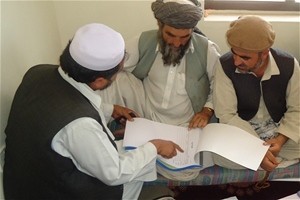
USAID field personnel distribute and demonstrate how to use the new decision letter booklets with village elders in Surkhrod District, Nangarhar Province.
RLS-I Checchi Consulting/USAID
USAID promotes dialogue between district elders and the state to streamline justice systems
4 AUGUST 2011 | NANGARHAR, AFGHANISTAN
Continued war and conflict in Afghanistan has caused a disintegration of services within the state justice sector. To make up for this loss, traditional alternative dispute resolution mechanisms (ADR) have re-emerged across the country. These informal justice systems – usually based on interactions and decisions between village elders at a localized level – are the standard in many areas for delivering justice in Afghanistan.
Approximately 1,500 village elders and district officials (35 percent are women) have participated in USAID-conducted discussion sessions to bridge gaps and strengthen links between ADR and state justice sectors in Afghanistan.
While both systems operate independently of each other, both state and ADR participants agree that justice is best served when cases are referred between the two systems. However, the referral and registration process lacks systemization with many case decisions going unregistered.
With assistance from USAID, ADR and state actors developed decision letter booklets that document legal cases and decisions within the ADR system. Using the booklet, copies of the dispute and settlement are registered with both the local and state justice provider and the disputants. This process centralizes the filing system and keeps multiple records of a dispute’s outcome.
“Before the decision letter booklets, people involved in a dispute would often forget about how they came to a final decision, and in many cases the dispute would arise again. That does not happen now,” said Mudir Khan, an elder in Dand District, Kandahar Province.
Both elders and district officials believe the booklets are a good way of creating better communication between the country’s informal and formal justice sectors and improving the justice system in Afghanistan.







Comment
Make a general inquiry or suggest an improvement.